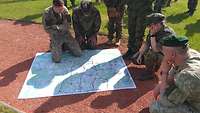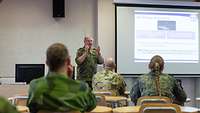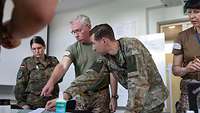First NATONorth Atlantic Treaty Organization training for medical officers
First NATONorth Atlantic Treaty Organization training for medical officers
- Date:
- Place:
- Europe
- Reading time:
- 3 MIN
In cooperation with the Estonian Military Academy (EMA) in Tartu, the MMCCMultinational Medical Coordination Centre/EMCEuropean Medical Command created the new NATONorth Atlantic Treaty Organization Advanced Medical Staff Officer Course (NAMSOC). "The first of its kind," says participant Captain Madelaine Schillerwein, "it offered medical officers from eleven nations a training package from 07 to 16 June to be able to work in a medical section of a brigade or division.
The aim of the new course is to understand the function, role and responsibilities of the medical staff of a brigade as part of a combat division. In addition, participants will gain the competence to specifically contribute their medical expertise to the decision-making process of the brigade leadership. Through good planning and coordination to maintain a medical support system as part of the overall system, health and combat effectiveness should be maintained and restored and troops medically supported.
Focus on combat operations in the context of NATONorth Atlantic Treaty Organization major operations and in alliance contingencies
The programme included a variety of presentations on land tactics, defensive and offensive operations and their medical support for large-scale military operations. The Director of the MMCCMultinational Medical Coordination Centre/EMCEuropean Medical Command, Brigadier General Dr Stefan Kowitz, as well as the Estonian Surgeon General, Lieutenant Colonel Dr T. Lusti, also took the opportunity to give a short lecture on their specific topics. In order to broaden mutual understanding, one participant from each nation presented the national military medical system and how it interacts with the respective national civilian medical support system.
Training highlights: Wargaming and culture
The learned planning for the medical support of defensive and offensive brigade operations was at the same time part of the preparations to apply the newly acquired knowledge in practice. The highlight of the training was the two-day wargaming, in which the participants were allowed to take on certain roles, such as medical-logistical planning, medical consultation, patient evacuations or even taking over the management of medical facilities. The programme was rounded off by a cultural visit to Narva, a city in the north of Estonia on the Russian border. The Estonian hosts had organised a visit to the border control point with Russia, which forms the external border of the EUEuropean Union and NATONorth Atlantic Treaty Organization.
The example of Ukraine: patient management is a challenge for medical forces
The current topic was presented by a video link with the Ukrainian Brigadier General Tetyna Ostaschenko, Commander of the Medical Forces of the Ukrainian Armed Forces. She gave an overview of the current workload of the medical forces and made it clear that managing the treatment of injured soldiers, including managing the flow of patients, is a major challenge.
New course fills knowledge gap
Through the course, participants had the opportunity to expand their international network and deepen their knowledge of military tactical details. "Participants were able to share their awareness of the different requirements of working in the medical field at brigade and division level," concluded MMCCMultinational Medical Coordination Centre/EMCEuropean Medical Command Deputy Director for NATONorth Atlantic Treaty Organization Affairs, Colonel Jürgen Muntenaar. "The NATONorth Atlantic Treaty Organization Advanced Medical Officer Course will be conducted annually in the future to fill a gap in providing combined military medical and tactical knowledge to medical officers in NATONorth Atlantic Treaty Organization and Europe.






